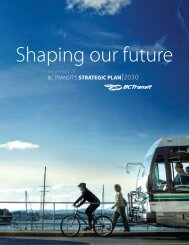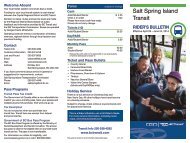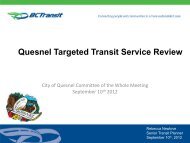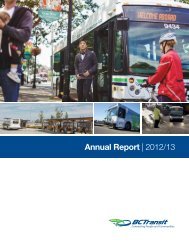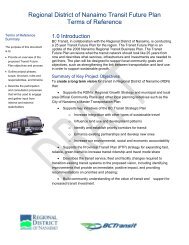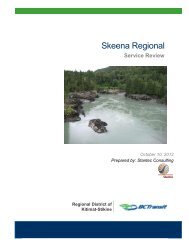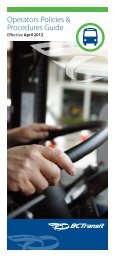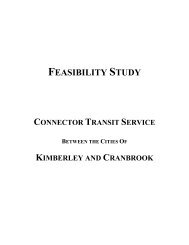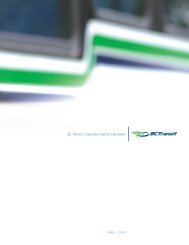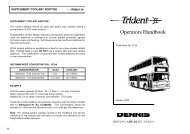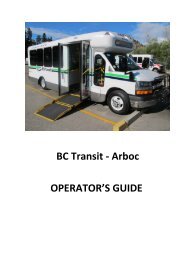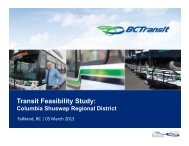ANNUAL REPORT 2008/09 - BC Transit
ANNUAL REPORT 2008/09 - BC Transit
ANNUAL REPORT 2008/09 - BC Transit
- No tags were found...
Create successful ePaper yourself
Turn your PDF publications into a flip-book with our unique Google optimized e-Paper software.
in restatement of prior year balances in accordance withCanadian generally accepted accounting principles.CRITICAL ACCOUNTING ESTIMATESThe preparation of <strong>BC</strong> <strong>Transit</strong>’s financial statements requiresmanagement to adopt accounting policies that involvethe use of significant estimates and assumptions. Theseestimates and assumptions are developed based on the bestavailable information and are believed by management tobe reasonable under the existing circumstances. New eventsor additional information may result in the revision of theseestimates over time. A summary of the significant accountingpolicies used by <strong>BC</strong> <strong>Transit</strong> can be found in the notes to thefinancial statements.SIGNIFICANT ACCOUNTING CHANGESCurrent Year ChangesEffective April 1, <strong>2008</strong>, <strong>BC</strong> <strong>Transit</strong> implemented the followingaccounting policy changes:• Amortization of capital assets changed from thesinking fund method to straight line amortization.In management’s view, the change to straight lineamortization more accurately reflects the charge ofthe asset over its useful economic life and is moreconsistent with industry practice resulting in greatercomparability.• Capitalization and amortization of capital assetschanged from a “single asset” approach to a“component” approach. Under a componentapproach, an asset is broken down into its majorcomponents that have significantly different usefullives. As a result of the change, a significant portionof the expenditures incurred under <strong>BC</strong> <strong>Transit</strong>’s longrange maintenance plan which were previouslyexpensed are now capitalized and amortized overtheir estimated useful lives. In management’s view,the change to component based capitalization andamortization more accurately reflects assetcapitalization principles and the useful life ofthe long range maintenance plan expenditures.Management believes that the change in accountingpolicy will also provide increased comparabilitybetween both current and future industry practice.This is permissible under existing Canadianaccounting principles but is required underInternational accounting standards should thisbecome <strong>BC</strong> <strong>Transit</strong>’s disclosed basis of accounting(see discussion below under futureaccounting changes).• <strong>BC</strong> <strong>Transit</strong> adopted Section 3031, “Inventories”.The new standard replaces the previous inventorystandard and requires inventory to be measuredat the lower of cost and net realizable value. Costis determined on a first-in, first-out or weightedaverage cost basis. Net realizable value isdetermined as the selling price less costs tocomplete and sell. Under the new standard,major spare parts having a life greater than thenormal operating cycle are reclassified frominventory to capital assets.• <strong>BC</strong> <strong>Transit</strong> adopted Section 3862 “FinancialInstruments – Disclosures” and Section 3863“Financial Instruments – Presentation”. The newdisclosure standards increase the disclosureregarding the nature and extent of the risksassociated with financial instruments and how thoserisks are managed.Future ChangesAt date of writing, there remains uncertainty over the futuredirection of financial reporting for government organizations.In 2006, Canada’s Accounting Standards Board ratified astrategic plan that will result in Canadian General AcceptedAccounting Principles, as used by publicly accountableenterprises, being fully converged with International FinancialReporting Standards (IFRS) as issued by the InternationalAccounting Standards Board over a transitional period to becomplete by 2011. This raised the question as to whether30<strong>BC</strong> TRANSIT <strong>2008</strong>/<strong>09</strong> <strong>ANNUAL</strong> <strong>REPORT</strong>



